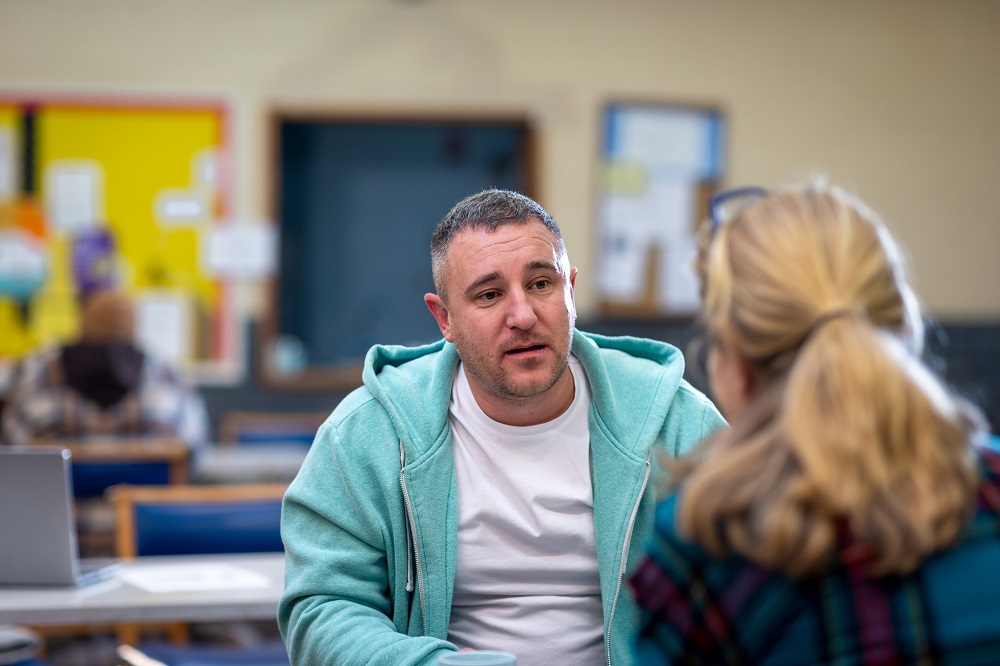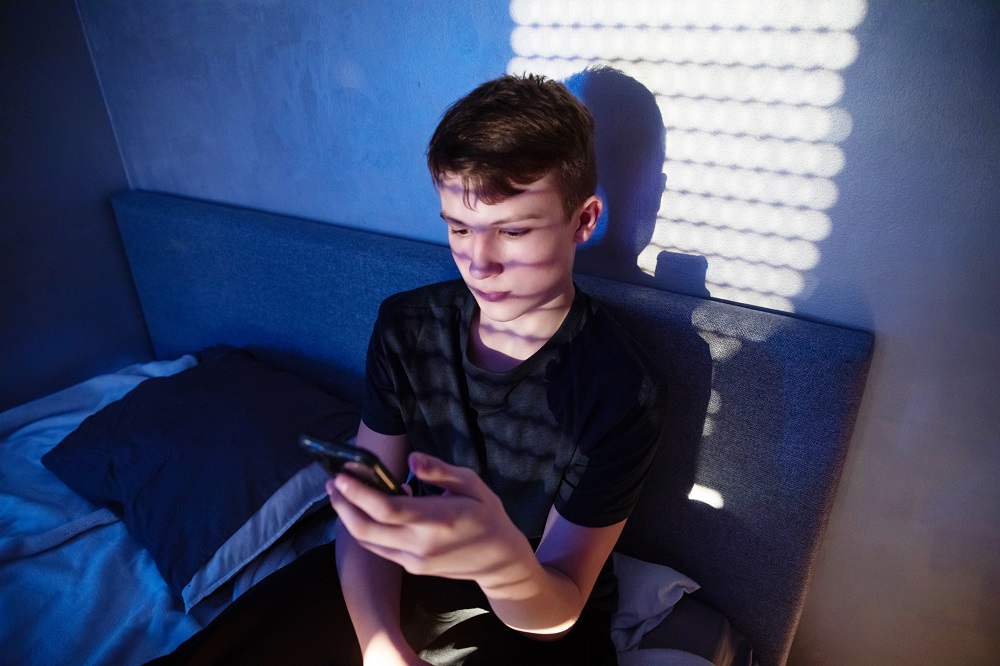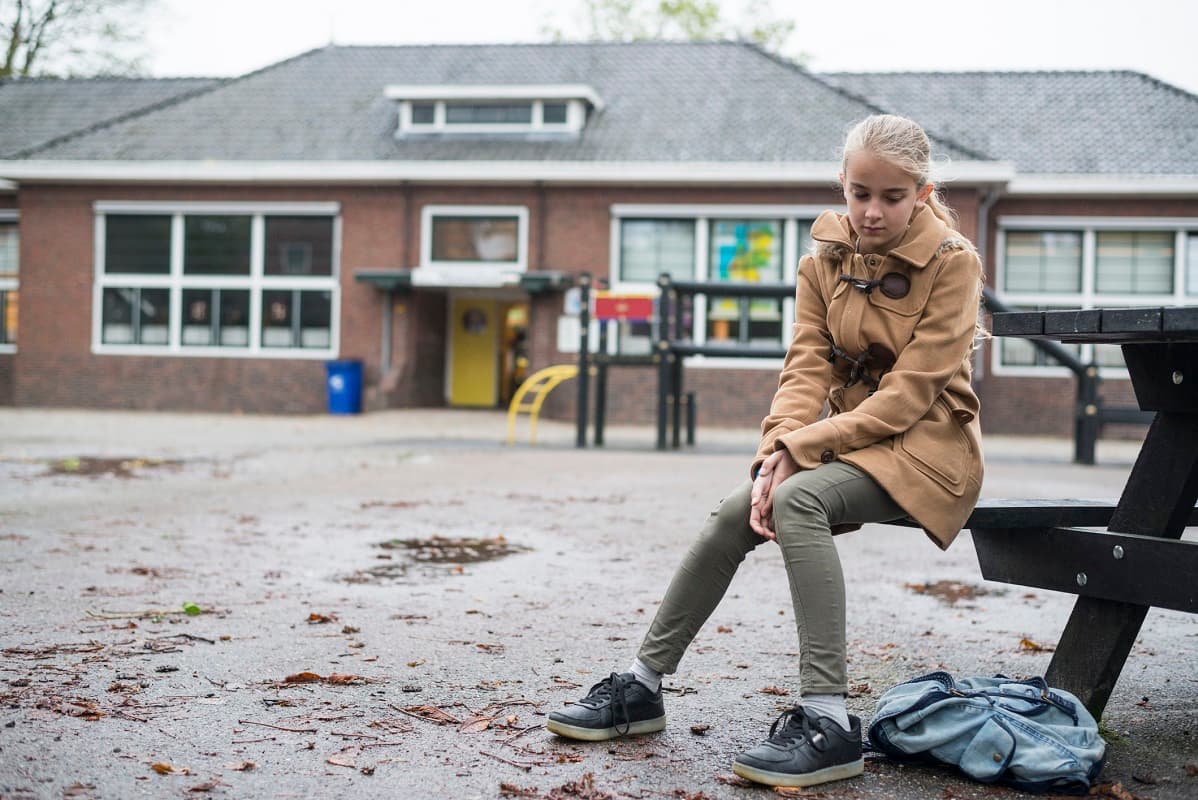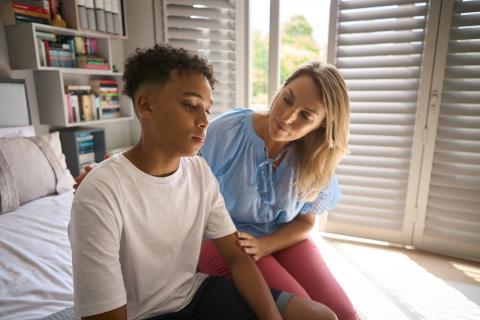If anxiety is preventing your child from going to school this can be stressful, but there are things you can do and people you can talk to who can help. Here are some tips.
Tips for helping your child
Tip #1: Stay calm
One of the best things you can do to help your child is to stay calm. Getting upset or angry with them will only make them more anxious, so try to keep your cool when you’re with them.
They may really want to go to school but their symptoms of low mood or anxiety make it too difficult. If you are disappointed with them this only makes them feel worse about themselves. They will want to succeed, so try to understand that they are doing all that they can.
It’s a good idea to have someone else to talk to about it, like a family member or friend – this will make it easier to keep calm when you’re with your child.
Tip #2: Talk to your child and listen
If you want to get to the bottom of what’s bothering your child, give them plenty of chances to talk to you. It may be easier for them to talk to them while you’re doing something else, like cooking the tea, travelling in the car, or walking somewhere. Listen carefully to what they have to say and be as kind as you can. Remember, what may seem trivial to you may be huge to them. Try not to always offer solutions.
Our pages on encouraging your child to confide in you and talking and listening to your teen have lots of tips to help with these conversations.
Tip #3: Talk to the school

You may feel you have to deal with this on your own but you don’t – your child’s school is there to help. So it’s really important to get in touch with the school so they can help you and your child. Our page on talking to the school has information and advice to help you.
Tip #4: Plan for any challenges
Having a plan for tricky situations can help. Practising how to cope when things are hard can help with confidence.
For example, you could give them a special thing of yours that helps them feel safe. Or they could create ‘coping cards’ – these are small cards they can carry around with them with helpful advice written on them, like ‘I can ask for help any time’ or ‘Breath in for 4 and out for 4’.
Childline’s Calm Zone has lots of ways to help children and young people feel calm and safe.
Tip #5: Help them understand how they're feeling
Helping your child understand how they’re feeling in their body helps too. Remind them that it’s normal to feel symptoms of worry when we’re facing new situations and these feelings aren’t dangerous. For example, if they saw a huge lion they would feel scared and feel their breathing and heart rate change, and they would feel sweaty and tense – these are all normal feelings we have when we're anxious and are designed to keep us safe.
Tip #6: Reassure them then move on
If you child is seeking lots of reassurance, try to reassure them just once then move on. Lots of reassurance about separation from you or other worries could cause your child to get stuck in a worry loop. Give them the confidence by showing that you have confidence in them.
Tip #7: Suggest they make a calm or self-soothe box
A a calm or self-soothe box contains things that can help your child ground themselves and calm down if they’re feeling stressed, anxious or panicked. It can include things like fidget toys to distract them, photos of happy memories, calming essential oils and cards with breathing exercises on. It doesn’t need to be a box – it could be a carrier bag! You can find out more about how to make a self-soothe box on the YoungMinds website.
Tip #8: Trying using an 'anxiety iceberg'
This video from YoungMinds shows you how to create an ‘anxiety iceberg’ with your child, to help you identify what’s bothering them. Helping you child remember that worries can pass and that things can get better gives them hope.
The YoungMinds website has more great tips on how to help your child if they are feeling anxious.
Tip #9: Make the start to the school day as stress free as you can
We’ve all done it – hopping to the bus stop in one shoe while trying to stuff a packed lunch into their rucksack and yelling at them to hurry up. But the calmer you can be as they get ready for school, the less stressful it’ll be for your child. Not easy we know, but doing all or any of these things the night before will make things run more smoothly:
- packing school bags and setting out outfits and coats (it can often help if these are not set out in the child’s room at night as it can act as a trigger for anxiety about school)
- charging any devices they need for school
- setting out everyone’s breakfast
- making everybody’s packed lunches and putting them in the fridge
- agreeing a routine for the following morning and when you will leave the house
- preparing everything you need for your day so in the morning you focus on your child.
It’s a good idea to get up a little earlier than usual so you have a moment of time to yourself. This will help you feel ready to support them.
If getting ready the night before frees up a bit of time, you could try doing something your child enjoys to calm them down before school, like listening to music, watching a funny video or playing a guessing game like I-spy.
Tip #10: Don’t talk about school too much
Unless they choose to talk to you about it, try not to speak to them too much about trying to get to school, especially late in the evening or when they get up. Just remind them you are there for them so they feel supported and calm.
Tip #11: Don't force them to go in
Forcing your child to go to school without addressing the things that are making them anxious or scared won’t solve anything in the long run and could even make things worse. Let the school know that they’re absent because of anxiety, as this will open up a conversation.
It can be really hard to do this when you want them to be in school. But if they're really struggling and they feel psychologically unwell, their wellbeing is more important than their grades. When they feel calmer and more in control they will learn better, and they can always catch up on work either at home or school.
Tip #12: Talk to your GP
If you’re worried that your child is constantly anxious and upset, make an appointment to talk to your GP. You can go and see them on their own if your child won’t come with you. You can find out more about what your GP can do to help on the NHS Inform website.
Tip #13: Talk to your employer if you need to
If you need to take time off to be with your child, talk to your employer about what they can do to make this easier for you. For example, you may be able to work more flexibly, or take parental leave. Visit the ACAS website for more information on making a request to work flexibly and unpaid parental leave.
Tip #14: Help your child manage their screen time
Spending time online can be good for your child, especially if it helps them stay connected to their friends, have fun or relax. But if your child is spending too much time on their mobile phone, tablet, computer or games console and this is getting in the way of other important things, like sleep, family time or exercise, or if screen time is causing them anxiety (perhaps because they’re missing out on what their friends are doing) then it’s a good idea to help them take breaks from their screens.
Try to encourage them to log out every so often and do something different, like go for a walk, meet a friend or listen to music. You could try keeping certain times screen-free for the whole family, for example at mealtimes, before bedtime or on an evening when you spend time together.
Tip #15: Celebrate success... it may take time

It’s unlikely the issues will solve themselves overnight, so be patient with your child and celebrate any small wins. If they manage to get ready for school but don’t make it through the door, that’s still a big step forward. If they get up and stay calm but don’t manage to stay in school for all the time planned then that is a win too. There will be lots of small wins, so whatever they are, be kind to your child and to yourself too.
What are my rights if my child can’t attend school?
Whether your child is off school because of mental or physical ill health, it’s important to know that they have the right to an education and to the support they need. This means that the school must put measures in place to support your child’s mental health. It also means they should provide your child with a way to keep learning while they’re off. This will vary from school to school, but could include online learning.
The Enquire website has more information on what to do if your child is missing school due to anxiety or other mental health needs. They also have lots of information on attendance and exclusion you may find useful.
However, remember that you do need to let the school know when and why your child is off school. You can find out more about school attendance on the gov.scot website.
Getting help and support
As well as your child’s school and GP, there are lots of other organisations that can offer help and support.
- YoungMinds have more information about school refusal on their website and have a helpline and webchat and email service for parents.
- Enquire provides advice and information to parents and carers whose children need additional support for learning.
- Not Fine In School offers advice for parents and carers whose children are experiencing school attendance barriers. They have a Facebook group where you can share experiences and get support from other parents going through the same thing.
 Activities & Play
Activities & Play Behaviour
Behaviour Childcare
Childcare Development & Growing Up
Development & Growing Up Family, Friends & Relationships
Family, Friends & Relationships Feeding Your Baby
Feeding Your Baby Food & Eating
Food & Eating Health & Safety
Health & Safety Mental Health & Wellbeing
Mental Health & Wellbeing Money & Work
Money & Work Online Behaviour & Safety
Online Behaviour & Safety Pregnancy & First Days
Pregnancy & First Days School & Education
School & Education Sleep
Sleep










 Online Behaviour & Safety
Online Behaviour & Safety
 Mental Health & Wellbeing
Mental Health & Wellbeing